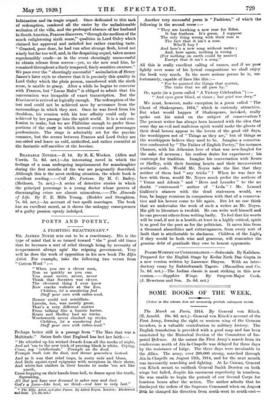POETS AND POETRY.
A FIGHTING REACTIONARY.*
Me. ALFRED Novas sets out to be a reactionary. His is the type of -mind that is so turned toward " the " good old times that he becomes a sort of rebel through being by necessity of temperament always agin' the reigning government. Very well he does the work of opposition in his new book The Elfin Artist. For example, take the following two verses from " Cotton-Wool " :— " When you see a clever man, Run as quickly as you can. You must never, never, never Think that Socrates was clever. The cleverest thing I ever knew Now cracks walnuts at the Zoo.
Children, let a wandering fool
Stuff your care with cotton-wool.
Homer could not scintillate. Lincoln, too, was merely great. That's a very different matter From talking like a frantic hatter. Keats and Shelley had no tricks. Wordsworth never climbed up sticks.
Children, let a wandering fool Stuff your ears with cotton-wool."
Perhaps better still is a passage from " The Man that was a Multitude." Satan finds that England has lost her faith :-
" He whistled up his wicked dwarfs from all the nooks of night, And set 'em to the new trick of proving black is white. Crying, Come, my intellectuals.' Trample' on the dead.
Trample truth into the dust, and throne yourselves instead.
And so it was that rebel imps, in sooty reds and blues, And little squint-eyed epigrams with scorpions in their shoes, And white-hot cinders in their breeks to make 'em act like youth, Came hopping on their hands from hell, to dance upon the truth, Sqneang,
All that you have ever dreamed is ashes now and dust. God's a force—like heat, we think—and love is only lust."
• The Elfin Artist. and other Poems. By Alfred Noyes. London Blackwood and Sons. (7s. 6d. net.1
Another very successful poem is "Fashions," of which the following is the second verse :— " They are hawking a new rose for Eden. It has feathers. It's green. I suppose The only thing wrong with their rose is The fact that it isn't a rose.
Who'll buy ? And here's a new song without metre ; And, here again, nothing is wrong (For nothing on earth could be neater) Except that it isn't a song."
All this is really excellent calling of names, and if we peas lightly over some of his lyrical compositions we shall enjoy the book very much. In the more serious poems he is, un-
fortunately, capable of lines like this :- " For he painted the things that matter, The tints that we all pass by."
Or, again (in a poem called " A Victory Celebration ") And eyes grew blind, at times ; but grief was deep."
We must, however, make exception in a poem called " The Ghost of Shakespeare, 1914," which is curiously attractive. But what would happen if Shakespeare, invoked, really spoke out his mind on the subject of conservatism ? The present writer has always been haunted with the idea that some day an evil and malicious spirit would make the ghosts of their dead heroes appear to the lovers of the good old days, the worshippers not of " Things as they are," but of things as the worshippers believe they used to be. Imagine a conserva- tive confronted by " The Father of English Poetry," for instance Chaucer, with his Athenian love of what was new-fangled for the sake of newness ; his restless desire for experiment ; his contempt for tradition. Imagine his conversation with Keats or Shelley, with their burning hearts and their inconvenient aesthetic code. Would Mr. Noyes take the line that they neither of them had " any tricks " 7 When he was face to face with them, would Mr. Noyes much prefer the authors of " Venus and Adonis " and " Hero and Leander " to • the no doubt " contemned " author of " Leda " 7 Mr. Lemuel Gulliver's seances with the dead statesmen would, we fear, be happy reunions in comparison with that of a conserva- tive and his heroes come to life again. But let no one think that we undervalue the work of such a writer as Mr. Noyes. His gift to literature is twofold. He can write well himself and he can prevent others from writing badly. To feel that his words will be read, if not in a hostile, at least in a highly critical, spirit is as good for the poet as for the politician. It saves him from a thousand absurdities and extravagances, from every sort of fault that is attributable to slackness. Children of the Light, if they would be both wise and generous, will remember the genuine debt of gratitude they owe to honest opponents.






































 Previous page
Previous page